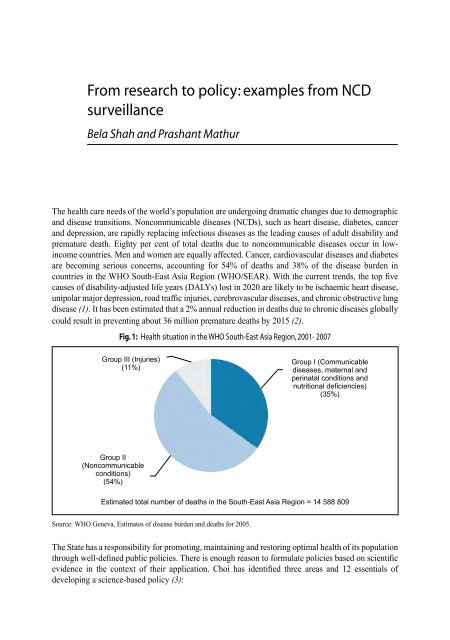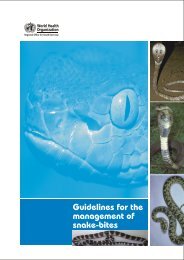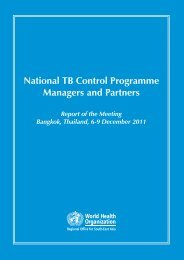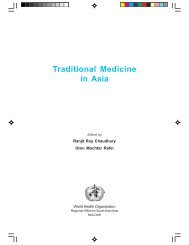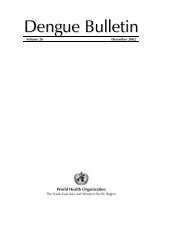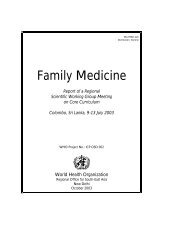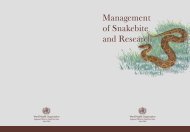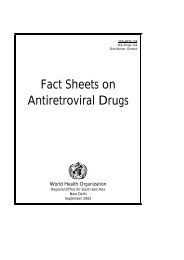- Page 2 and 3:
South-East
- Page 4 and 5:
Contents Preface ..................
- Page 6 and 7:
South-East
- Page 8:
South-East
- Page 12 and 13:
Foreword The health systems in seve
- Page 14 and 15:
South-East
- Page 16 and 17:
South-East
- Page 18:
Section 1 Opening ceremony Executiv
- Page 21 and 22:
Conference objecti
- Page 23 and 24:
Opening remarks Dr Samlee Plianbang
- Page 25 and 26:
Inaugural address Mr Kapil Sibal Ho
- Page 27 and 28:
10 | South-<strong
- Page 29 and 30:
12 | South-<strong
- Page 31 and 32:
14 | South-<strong
- Page 33 and 34:
16 | South-<strong
- Page 36:
Plenary 1 The enduring relevance of
- Page 39 and 40:
22 | South-<strong
- Page 41 and 42:
24 | South-<strong
- Page 43 and 44:
26 | South-<strong
- Page 45 and 46:
28 | South-<strong
- Page 47 and 48:
Revitalizing primary health care: h
- Page 49 and 50:
32 | South-<strong
- Page 51 and 52:
34 | South-<strong
- Page 53 and 54:
36 | South-<strong
- Page 55 and 56:
38 | South-<strong
- Page 58:
Plenary 2 Epidemiology: ensuring he
- Page 61 and 62:
44 | South-<strong
- Page 63 and 64:
46 | South-<strong
- Page 65 and 66:
48 | South-<strong
- Page 67 and 68:
50 | South-<strong
- Page 69 and 70:
52 | South-<strong
- Page 72 and 73:
Translating data into information f
- Page 74 and 75:
Fig. 2: Transmission of SARS in Sin
- Page 76 and 77:
Research and policy interface Ulyss
- Page 78:
South-East
- Page 82 and 83:
Monitoring progress towards the ach
- Page 84 and 85:
South-East
- Page 86 and 87:
South-East
- Page 88 and 89:
Social determinants of health, MDGs
- Page 90 and 91:
South-East
- Page 92 and 93:
MDGs 4 and 5: the challenge of redu
- Page 94 and 95:
Source: World Health Statistics, 20
- Page 96:
• • South-<str
- Page 100 and 101:
Methods and application of molecula
- Page 102 and 103:
South-East
- Page 104 and 105:
South-East
- Page 106 and 107:
South-East
- Page 108 and 109:
Scope South-<stron
- Page 110 and 111:
South-East
- Page 112 and 113:
The future of epidemiology: how is
- Page 114 and 115:
Table: Quick poll of epidemiology g
- Page 116 and 117:
Towards universal childhood immuniz
- Page 118 and 119:
South-East
- Page 120 and 121:
a. b. South-<stron
- Page 122:
Plenary 6 Human resources in epidem
- Page 125 and 126:
108 | South-<stron
- Page 127 and 128: 110 | South-<stron
- Page 129 and 130: 112 | South-<stron
- Page 131 and 132: 114 | South-<stron
- Page 133 and 134: 116 | South-<stron
- Page 135 and 136: 118 | South-<stron
- Page 137 and 138: 120 | South-<stron
- Page 140: Section 3 Special lectures
- Page 144 and 145: Economic crisis and health of the p
- Page 146 and 147: South-East
- Page 148 and 149: Country Fig. 4: Growth shocks <stro
- Page 150 and 151: PRC HKG PHI SIN MAL THA INO KOR IND
- Page 152 and 153: 6. Recommendations 6.1 Monitoring a
- Page 154 and 155: The use of epidemiological data to
- Page 156 and 157: Fig. 1: Modelling the IDU epidemic
- Page 158 and 159: South-East
- Page 160: Section 4 Parallel Sessions
- Page 164 and 165: Facilitating appropriate response i
- Page 166 and 167: South-East
- Page 168 and 169: (5) (6) (7) South-
- Page 170 and 171: South-East
- Page 172 and 173: South-East
- Page 174 and 175: South-East
- Page 176: Parallel Session 2 Noncommunicable
- Page 181 and 182: 164 | South-<stron
- Page 183 and 184: Reducing the burden of cardiovascul
- Page 185 and 186: 168 | South-<stron
- Page 187 and 188: 170 | South-<stron
- Page 189 and 190: Research and evidence-building for
- Page 191 and 192: 174 | South-<stron
- Page 194 and 195: The role of current diarrhoea manag
- Page 196 and 197: Global child deaths due to rotaviru
- Page 198 and 199: South-East
- Page 200 and 201: Health Facility 22% 25% 18% Fig. 3:
- Page 202 and 203: Integrating prevention and control
- Page 204 and 205: South-East
- Page 206 and 207: South-East
- Page 208: Parallel Session 4 Disease epidemio
- Page 211 and 212: 194 | South-<stron
- Page 213 and 214: 196 | South-<stron
- Page 215 and 216: 198 | South-<stron
- Page 217 and 218: 200 | South-<stron
- Page 219 and 220: 202 | South-<stron
- Page 221 and 222: 204 | South-<stron
- Page 223 and 224: 206 | South-<stron
- Page 225 and 226: 208 | South-<stron
- Page 227 and 228:
210 | South-<stron
- Page 229 and 230:
212 | South-<stron
- Page 232 and 233:
Trends in tuberculosis: what is the
- Page 234 and 235:
South-East
- Page 236 and 237:
TB cases/100k/year South</s
- Page 238 and 239:
South-East
- Page 240 and 241:
South-East
- Page 242 and 243:
Towards universal access to HIV pre
- Page 244 and 245:
South-East
- Page 246 and 247:
1995 2005 Fig. 3: Targeted interven
- Page 248 and 249:
320,000 280,000 240,000 200,000 160
- Page 250:
Parallel Session 6 Climate change:
- Page 253 and 254:
236 | South-<stron
- Page 255 and 256:
238 | South-<stron
- Page 257 and 258:
240 | South-<stron
- Page 259 and 260:
242 | South-<stron
- Page 261 and 262:
244 | South-<stron
- Page 263 and 264:
Impact of climate change on diarrho
- Page 265 and 266:
248 | South-<stron
- Page 267 and 268:
250 | South-<stron
- Page 269 and 270:
The impact of climate change on vec
- Page 271 and 272:
254 | South-<stron
- Page 273 and 274:
256 | South-<stron
- Page 275 and 276:
258 | South-<stron
- Page 277 and 278:
260 | South-<stron
- Page 279 and 280:
The role of influenza surveillance
- Page 281 and 282:
264 | South-<stron
- Page 283 and 284:
266 | South-<stron
- Page 285 and 286:
268 | South-<stron
- Page 287 and 288:
270 | South-<stron
- Page 289 and 290:
272 | South-<stron
- Page 291 and 292:
274 | South-<stron
- Page 293 and 294:
276 | South-<stron
- Page 295 and 296:
278 | South-<stron
- Page 297 and 298:
280 | South-<stron
- Page 300:
Parallel Session 8 FETP and other a
- Page 303 and 304:
286 | South-<stron
- Page 305 and 306:
288 | South-<stron
- Page 307 and 308:
290 | South-<stron
- Page 309 and 310:
292 | South-<stron
- Page 311 and 312:
294 | South-<stron
- Page 313 and 314:
296 | South-<stron
- Page 315 and 316:
298 | South-<stron
- Page 317 and 318:
300 | South-<stron
- Page 320 and 321:
Evidence-informed policy network (E
- Page 322 and 323:
Fig. 2: EVIPNet policy brief worksh
- Page 324 and 325:
South-East
- Page 326 and 327:
India blindness control Sou
- Page 328 and 329:
Acknowledgements South</str
- Page 330 and 331:
South-East
- Page 332 and 333:
South-East
- Page 334 and 335:
South-East
- Page 336:
Parallel Session 10 Leadership, man
- Page 339 and 340:
322 | South-<stron
- Page 341 and 342:
324 | South-<stron
- Page 343 and 344:
326 | South-<stron
- Page 345 and 346:
Management modules in epidemiology
- Page 347 and 348:
Leadership and management training
- Page 349 and 350:
332 | South-<stron
- Page 352:
Section 5 Skill Building
- Page 356 and 357:
Health research: concepts, methods
- Page 358 and 359:
South-East
- Page 360 and 361:
South-East
- Page 362 and 363:
South-East
- Page 364 and 365:
Epidemiological research and method
- Page 366 and 367:
South-East
- Page 368:
Scientific writing Chairpersons: Ro
- Page 371 and 372:
354 | South-<stron
- Page 373 and 374:
356 | South-<stron
- Page 375 and 376:
Increasing your chances of getting
- Page 377 and 378:
360 | South-<stron
- Page 380 and 381:
Valedictory address Nirmal K. Gangu
- Page 382:
Vote of thanks Shiv Lal Sou
- Page 386 and 387:
Annex 1. Programme Monday, 8 March
- Page 388 and 389:
1600 - 1730 Hrs Parallel Sessions P
- Page 390 and 391:
Panel discussion: Climate change: a
- Page 392 and 393:
Wednesday, 10 March 2010 0900 - 103
- Page 394 and 395:
Nominees of Member Countries Bangla
- Page 396 and 397:
25. 26. Nepal 27. 28. 29. 30. Sri L
- Page 398 and 399:
50. 51. 52. 53. 54. 55. Dr Laurette
- Page 400 and 401:
74. 75. 76. 77. 78. 79. 80. Dr Jame
- Page 402 and 403:
98. 99. 100. 101. 102. 103. Dr Saro
- Page 404 and 405:
126. 127. 128. 129. 130. 131. 132.
- Page 406 and 407:
155. 156. 157. 158. 159. Dr. V. Kum
- Page 408 and 409:
181. 182. 183. 184. 185. 186. 187.
- Page 410 and 411:
222. 223. 224. 225. 226. 227. 228.
- Page 412 and 413:
268. 269. 270. 271. 272. 273. 274.
- Page 414 and 415:
313. 314. 315. 316. Dr Po-Lin Chan
- Page 416:
398 | South-<stron


